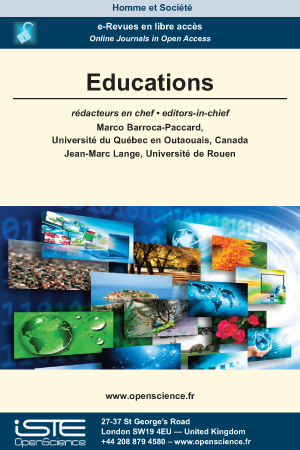

Social Sciences and Humanities > Home > Educations > Issue
This article explores the relationship between how students conceive school rules and codes as a protolegal
framework of the hidden curriculum and citizenship education. The robustness of Ewick and Silbey’s legal
consciouness model, as well as Westheimer and Kahne’s citizenship typology in describing this relationship is evaluated
through the study of two cases where high school students must resolve a legal situation. The results of the analysis lead
to conclude that the third level of Ewick and Silbey’s model does not allow for a distinction between legitimately contesting
a law and an anomic rejection of the law. It further highlights the importance of distinguishing legal education from rights
education.
The relatively recent foundation of Information Literacy formation within school systems contributes to the legitimization process of it with, in particular, the introduction of the EMI (Media and Information Education) into the French education system. We made the assumption that the education of the three so-called information literacies (information literacy, computer literacy and media literacy) is made up of fragmented knowledge that the digital culture (in its socio-economic and educational practices) could well integrate into a common narrative. We have created two
corpuses (2013, 2016) in order to highlight the discursive convergences and discrepancies between the three cultures and their inclusion in recent institutional texts in France. Does the integration or convergence of these cultures, within a school doxa under construction, reveal new balances or imbalances?
The "educations for" emanate from international authorities, set in charge of societal issues, and position at least partially in the political arena. It is thus a question of wondering about the curriculaires conditions allowing to counter the risks of normative drift to aim towards a political citizenship. The approach(initiative) leans on the methods of the critical thought, raises(finds) four necessary skills, proposes concrete tools to implement(operate) them (epistemology, social representations, bibliography, formalization of criteria, systematic steps(initiatives) of search for meaning), and also show what it gives within the framework of the education to the sustainable development.
Education for sustainable development is part of the mainstream of global education. It is probably the most visibly political. It is indicative of the tensions that also exist in other education for. Consequently, its acceptance as a curriculum and its implementation cannot be carried out without its legitimation by a referential metanarrative. To what kind of metanarrative do the actors and stakeholders of this education refer? How do we think about these questions from a curricular point of view and from a didactic point of view? It is these questions that this article proposes to take charge of, not for the purpose of completion or completeness, but for the purpose of initiating new research perspectives.

2024
Volume 24- 8
Issue 12023
Volume 23- 7
Issue 12022
Volume 22- 6
Issue 12021
Volume 21- 5
Issue 12020
Volume 20- 4
Special issue2019
Volume 19- 3
Issue 12018
Volume 18- 2
Issue 12017
Volume 17- 1
Issue 1